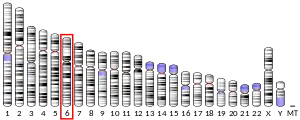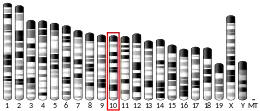Monocarboxylate transporter 10
Monocarboxylate transporter 10 (MCT 10), also known as aromatic amino acid transporter 1 and T-type amino acid transporter 1 (TAT1) and solute carrier family 16 member 10 (SLC16A10), is a protein that in humans is encoded by the SLC16A10 gene.[5][6][7] SLC16A10 is a member of the solute carrier family.
Function
SLC16A10 mediates Na+-independent transport of tryptophan, tyrosine, phenylalanine, and L-DOPA.[7]
See also
References
- GRCh38: Ensembl release 89: ENSG00000112394 - Ensembl, May 2017
- GRCm38: Ensembl release 89: ENSMUSG00000019838 - Ensembl, May 2017
- "Human PubMed Reference:". National Center for Biotechnology Information, U.S. National Library of Medicine.
- "Mouse PubMed Reference:". National Center for Biotechnology Information, U.S. National Library of Medicine.
- "Entrez Gene: solute carrier family 16".
- Kim DK, Kanai Y, Chairoungdua A, Matsuo H, Cha SH, Endou H (May 2001). "Expression cloning of a Na+-independent aromatic amino acid transporter with structural similarity to H+/monocarboxylate transporters". J. Biol. Chem. 276 (20): 17221–8. doi:10.1074/jbc.M009462200. PMID 11278508.
- Kim DK, Kanai Y, Matsuo H, Kim JY, Chairoungdua A, Kobayashi Y, Enomoto A, Cha SH, Goya T, Endou H (January 2002). "The human T-type amino acid transporter-1: characterization, gene organization, and chromosomal location". Genomics. 79 (1): 95–103. doi:10.1006/geno.2001.6678. PMID 11827462.
Further reading
- Toure A, Morin L, Pineau C, et al. (2001). "Tat1, a novel sulfate transporter specifically expressed in human male germ cells and potentially linked to rhogtpase signaling". J. Biol. Chem. 276 (23): 20309–15. doi:10.1074/jbc.M011740200. PMID 11278976.
- Friesema EC, Jansen J, Jachtenberg JW, et al. (2008). "Effective cellular uptake and efflux of thyroid hormone by human monocarboxylate transporter 10". Mol. Endocrinol. 22 (6): 1357–69. doi:10.1210/me.2007-0112. PMC 5419535. PMID 18337592.
- Loubière LS, Vasilopoulou E, Bulmer JN, et al. (2010). "Expression of thyroid hormone transporters in the human placenta and changes associated with intrauterine growth restriction" (PDF). Placenta. 31 (4): 295–304. doi:10.1016/j.placenta.2010.01.013. PMID 20167367.
- Strausberg RL, Feingold EA, Grouse LH, et al. (2002). "Generation and initial analysis of more than 15,000 full-length human and mouse cDNA sequences". Proc. Natl. Acad. Sci. U.S.A. 99 (26): 16899–903. Bibcode:2002PNAS...9916899M. doi:10.1073/pnas.242603899. PMC 139241. PMID 12477932.
- Bröer S (2008). "Amino acid transport across mammalian intestinal and renal epithelia". Physiol. Rev. 88 (1): 249–86. doi:10.1152/physrev.00018.2006. PMID 18195088. S2CID 1834804.
- Park SY, Kim JK, Kim IJ, et al. (2005). "Reabsorption of neutral amino acids mediated by amino acid transporter LAT2 and TAT1 in the basolateral membrane of proximal tubule". Arch. Pharm. Res. 28 (4): 421–32. doi:10.1007/BF02977671. PMID 15918515. S2CID 2139640.
- Halestrap AP, Meredith D (2004). "The SLC16 gene family-from monocarboxylate transporters (MCTs) to aromatic amino acid transporters and beyond". Pflügers Arch. 447 (5): 619–28. doi:10.1007/s00424-003-1067-2. PMID 12739169. S2CID 15498611.
This article is issued from Wikipedia. The text is licensed under Creative Commons - Attribution - Sharealike. Additional terms may apply for the media files.



